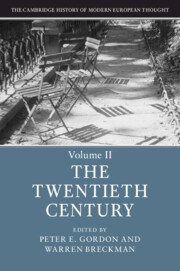Book contents
- The Cambridge History of Modern European Thought
- The Cambridge History of Modern European Thought
- The Cambridge History of Modern European Thought
- Copyright page
- Contents
- Contributors
- Preface
- Introduction
- 1 Sociology and the Heroism of Modern Life
- 2 Psychoanalysis: Freud and Beyond
- 3 Modern Physics: From Crisis to Crisis
- 4 Varieties of Phenomenology
- 5 Existentialism and the Meanings of Transcendence
- 6 Philosophies of Life
- 7 The Many Faces of Analytic Philosophy
- 8 American Ideas in the European Imagination
- 9 Revolution from the Right: Against Equality
- 10 Western Marxism: Revolutions in Theory
- 11 Anti-imperialism and Interregnum
- 12 Late Modern Feminist Subversions: Sex, Subjectivity, and Embodiment
- 13 Modernist Theologies: The Many Paths between God and World
- 14 Modern Economic Thought and the “Good Society”
- 15 Conservatism and Its Discontents
- 16 Modernity and the Specter of Totalitarianism
- 17 Decolonization Terminable and Interminable
- 18 Structuralism and the Return of the Symbolic
- 19 Post-structuralism: From Deconstruction to the Genealogy of Power
- 20 Contesting the Public Sphere: Within and against Critical Theory
- 21 Restructuring Democracy and the Idea of Europe
- Index
1 - Sociology and the Heroism of Modern Life
Published online by Cambridge University Press: 19 August 2019
- The Cambridge History of Modern European Thought
- The Cambridge History of Modern European Thought
- The Cambridge History of Modern European Thought
- Copyright page
- Contents
- Contributors
- Preface
- Introduction
- 1 Sociology and the Heroism of Modern Life
- 2 Psychoanalysis: Freud and Beyond
- 3 Modern Physics: From Crisis to Crisis
- 4 Varieties of Phenomenology
- 5 Existentialism and the Meanings of Transcendence
- 6 Philosophies of Life
- 7 The Many Faces of Analytic Philosophy
- 8 American Ideas in the European Imagination
- 9 Revolution from the Right: Against Equality
- 10 Western Marxism: Revolutions in Theory
- 11 Anti-imperialism and Interregnum
- 12 Late Modern Feminist Subversions: Sex, Subjectivity, and Embodiment
- 13 Modernist Theologies: The Many Paths between God and World
- 14 Modern Economic Thought and the “Good Society”
- 15 Conservatism and Its Discontents
- 16 Modernity and the Specter of Totalitarianism
- 17 Decolonization Terminable and Interminable
- 18 Structuralism and the Return of the Symbolic
- 19 Post-structuralism: From Deconstruction to the Genealogy of Power
- 20 Contesting the Public Sphere: Within and against Critical Theory
- 21 Restructuring Democracy and the Idea of Europe
- Index
Summary
Among the plethora of efforts to define modernity, Michel Foucault’s attempt in an essay answering the question “What is Enlightenment?,” which was famously posed by the eighteenth-century-Germany Aufklärer, is particularly suggestive. Modernity, he argued, is neither a temporal period nor adherence to a set of progressive beliefs and practices; it is instead an attitude, “the attitude that makes it possible to grasp the ‘heroic’ aspect of the present moment. Modernity is not a phenomenon of sensitivity to the fleeting present; it is the will to ‘heroize’ the present.” Here Charles Baudelaire’s seminal essays “The Salon of 1846: On the Heroism of Modern Life” and “The Painter of Modern Life” (1863), which celebrated the illustrator Constantin Guys’s depiction of the unsettled, turbulent world of the modern city, served Foucault as a recipe for a more general response to “modernity” in all of its motley variety.
- Type
- Chapter
- Information
- The Cambridge History of Modern European Thought , pp. 18 - 43Publisher: Cambridge University PressPrint publication year: 2019

